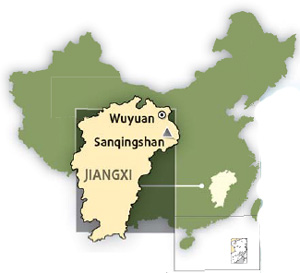
For all the money that used to flow into these households, you don't see much opulence. Residents in this quarter of the country believed in restraint. One telltale sign of the original owner's social status is the number of steps to the main entrance. If he was a high official, it would have been three steps. But those with only one step could have been as rich. Merchants brought fortune, but they did not get as much respect and they could not flaunt what they made by putting a three-step flight of stairs in front of their homes.
Another sign of wealth is the wood or brick carvings that adorn the hall. Most of the images, such as birds and flowers, carry auspicious meanings that derive from a play on words. Ditto for the de rigeur placement of a vase and a mirror that flank the family portrait facing the door. Vase (ping) and mirror (jing) are homonyms for the Chinese word for peace. And peace was the most frequent blessing left-behind mothers and wives gave to their family members out on extended business trips.

What we call mansions may not be imposing at first sight. The rooms may be small, dark and humid. The walls facing the street hardly have any windows. That is because the head of the household was often away and women and children had to be vigilant against robbery or other unwanted attentions.
The Yu Family Temple in the village of Wangkou may be an exception. The 260-year-old building is in a 665-sq-m area, and the central courtyard is large. But this 900-year-old village used to be a business district, so to speak, with more than 100 shops along a 600-m main street.
That said, villagers are friendly toward one another. Walls at crossroads often had their sharp edges removed, at once a symbol of being good neighbors and leaving more space for passersby. During the disastrous "cultural revolution" (1966-76), few had the guts to ransack other households.
According to locals, it was usually the "rebels" within the household who did much of the damage. Some of the woodcarvings are gone. But some are preserved. One family pasted a layer of clay over the central plaque and put "Long live Chairman Mao" over it, thus escaping the scrutiny and wrath of young revolutionaries.
Had there been no revolution, the wealth accumulated in these rural communities would have dribbled away anyway. Once commerce passed them by, they essentially turned into sleepy hamlets with little business activity. Even though Wuyuan is not far from the economic dynamos of Shanghai and Zhejiang, it could not attract much investment.